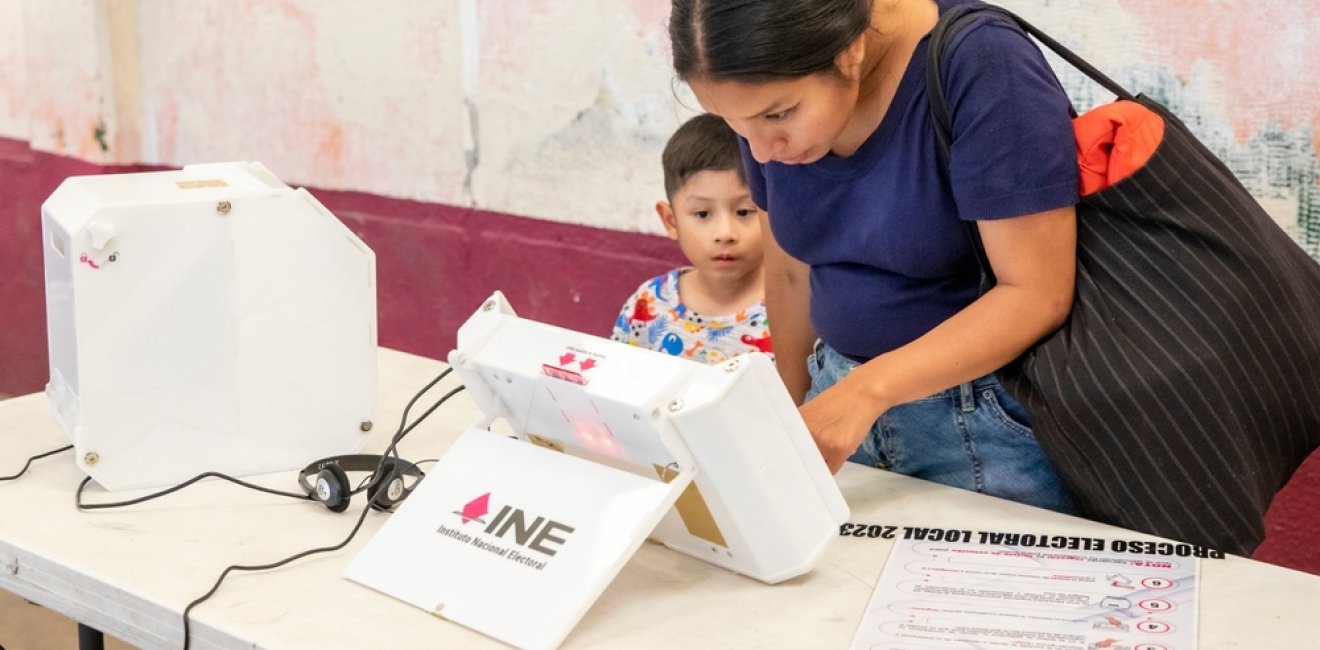Overview
The 2024 Mexican electoral process will be recognized as the largest in the history of the country, according to the National Electoral Institute (INE). On Sunday, June 2nd, 2024, the people of Mexico will elect the next President of the Republic, 128 Senators of the Republic, and all 500 members of the Chamber of Deputies. On the state and local level, votes will be cast for more than 19,000 races. Nine gubernatorial races will occur in the states of Chiapas, Guanajuato, Jalisco, Morelos, Puebla, Tabasco, Veracruz, Yucatán, and Mexico City. According to INE advisor Carla Humphrey, it is estimated that over 97 million Mexican voters will participate in the 2024 electoral process.
Mexican Population in the United States
The number of registered Mexican voters abroad exceeds 1.3 million. The number of these citizens with a confirmed voter ID has surpassed half a million people. Approximately 97% of Mexicans living abroad with a valid voting credential live in the United States. Los Angeles, Dallas, Chicago, and Houston are the cities with the highest number of potential votes. To gauge the influence that Mexican voters abroad will have, it's worth mentioning that Colima, the least populous state in the country, has a population of 731,391 inhabitants. Thus, the more than half a million citizens abroad have a political weight comparable to the voter power of an entire Mexican state.
Past Trends and Participation
The National Electoral Institute first granted Mexicans the opportunity to cast their vote from abroad in the 2006 Mexican presidential election. That election cycle saw 32,621 Mexican nationals exercise their right to vote from abroad. The PAN candidate in that race, Felipe Calderon, received 58.29% of these votes, while then PRD candidate and current Mexican President Andres Manuel Lopez Obrador, received 34.0%. In the 2012 presidential election, participation from voters abroad increased to 40,714 Mexican citizens, resulting in PAN once again receiving the majority of expatriate votes at 42.17%. On the other hand, then-candidate Lopez Obrador received 39.0% of votes from abroad. In the most recent presidential election in 2018, a total of 98,470 individuals cast their votes from abroad. In that race, President Lopez Obrador received 64.86% of the votes, with PAN candidate Ricardo Anaya coming in second with 26.75% of the votes.
Registering to Vote
Mexican voters abroad can process their voter identification card (credencial de elector) free of charge at the nearest Mexican embassy or consulate. Once they have valid voter identification, Mexican nationals can register on the INE website to participate in the upcoming 2024 Mexican elections. Voters can participate in one of three modalities: vote online, via physical mail, or in person at approved consulates. Those interested in participating in the elections must register by February 20, 2024.
State Election Participation
Mexican voters abroad can participate in state-level elections in the following nine states: Chiapas, Mexico City, the State of Mexico, Guanajuato, Jalisco, Morelos, Oaxaca, Puebla, and Yucatán. Of these states, the following five only allow Mexican votes abroad to participate in their gubernatorial elections: Chiapas, Guanajuato, Morelos, Puebla, and Yucatán. Mexico City will allow voters abroad to participate in electing a Head of Government and a Migrant Deputy. Jalisco and the State of Mexico will allow participation to elect proportional representation deputyship, with Jalisco also allowing participation to elect the governorship. Finally, the state of Oaxaca will allow participation to elect a Migrant Deputy. Participation by Mexican voters abroad is as important at the local level as it is in the presidential race.
Concluding Remarks
The 2024 Mexican elections, set to be the largest in the nation's history, symbolize a pivotal moment in Mexican democracy. With an unprecedented number of races and significant participation from Mexican expatriates, predominantly located in the United States, these elections reflect the evolving dynamics of Mexican politics. The expansion of voting rights to citizens abroad, mirroring the political weight of an entire state, and the diverse options for casting votes, underscore a growing recognition of the influence of the global Mexican community. This election cycle is set to be a landmark moment, shaping the future of Mexico, and highlighting the critical role of its global citizenry.
Author


Mexico Institute
The Mexico Institute seeks to improve understanding, communication, and cooperation between Mexico and the United States by promoting original research, encouraging public discussion, and proposing policy options for enhancing the bilateral relationship. A binational Advisory Board, chaired by Luis Téllez and Earl Anthony Wayne, oversees the work of the Mexico Institute. Read more

Explore More
Browse Insights & Analysis
Greenland’s New Governing Coalition Signals Consensus

The Future of France's Far-Right Party

Ukrainian Issue in Polish Elections

